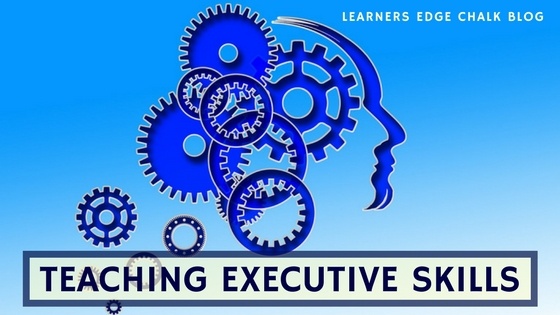Do you have a problem with students:
- Forgetting to write down assignments?
- Not turning in homework?
- Having a hard time adjusting to change?
- Expressing extreme emotion?
Executive skills are becoming a focal point for many educational professionals as success in both school and professional pursuits relies on mastering a wide array of executive functioning skills. These skills begin in preschool and become more completed and varied as children get older. Many of these skills are inherent in certain children, but other students must be directly taught these skills by adults and peers.
Amy Przybylski, an 8th-grade middle school math teacher from Michigan, shares her thoughts and insights below on how she would adapt her classroom environment and routines in order to help teach these important executive skills to her students.
Q. Share the BEST change you can make to your classroom environment in order to encourage, develop and reinforce executive skills.
A. This was difficult to choose the BEST change, but my need right now is to improve my physical and social aspects of the classroom. My classroom is already set up with student tables in a U-like shape. What I need to do is rearrange my students so that I have my students with low executive skills places next to students that excel. Skills that I am referring to are organization, attention, and task initiation. My 5th-hour class, after lunch, has the biggest struggle.
I also need to improve my classroom organization. I have a space where the students can access room items, but it isn’t clearly labeled for easy access. I would like to create some signs and add some shelves to make it user friendly. I may want to ask the students if the student supply area needs to be moved or changed in order to make it more effective for them.
Q. What routines would you implement in your classroom to help strengthen your students’ executive skills?
A. I chose the following 5 routines because I teach inclusion math classes. The students tend to struggle with task initiation, sustaining attention, organization, time management, and working memory. I feel these are the areas they need to master in order to be more successful in math.
- Getting Ready to Begin Class
- Changes to class:
- I will create a poster for the outside of my classroom listing/reminding the students what is needed for class.
- In the classroom, I will have a checklist on the projection screen for the students to follow to get them ready for class to begin. (I.e. sharpen pencils, get homework out to check, begin the math warm-up.) As soon at the bell rings for class to begin, I will set the class timer. In case I something happens, a small checklist will be taped to each table as a reminder.
- Changes to class:
- End of Class Routine
- Changes to class:
- I will end class 5 minutes early in order to close up shop. (At the moment, my principal makes us teach bell to bell.) During the last 5 minutes, I will have the students follow a checklist to conclude class. This includes filling out their student planner properly with what they completed in class and any work that needs to go home. A small checklist can be taped to the desks as a reminder too.
- I already post assignments to the website and in class, so I will continue to do so.
- Changes to class:
- Teach Students How to Pay Attention
- Changes to class:
- I will incorporate self-monitoring sheets to my classes as a whole. I will put copies of an On-Task Self-Monitoring sheets in clear sleeves. They will use dry-erase markers to monitor themselves. The students will use this sheet to practice being actively engaged during lesson/activity. The class as a whole can win a reward if the entire class is 80% on-task. This way they are holding their classmates accountable.
- I will also, add some pop quizzes during the class. This will keep the students on their toes and focused.
- Changes to class:
- Organizing Notebooks/Homework
- Changes to class:
- I will incorporate a checklist to show/teach the students what is needed in their math notebooks to be successful.
- A notebook check will be done weekly. It will be part of their participation grade.
- For students that cannot afford a system to organize their math work, I will supply them with something or ask for donations.
- Changes to class:
- Studying for Tests
- Changes to class:
- I will use the “Tools for Studying” form to help students prepare for upcoming tests or quizzes. I will demonstrate how to use the form. This form can be turned in for extra credit on testing day.
- I will create a Quizlet for students to use to prepare for an assessment.
- As a class activity, the students can create study cards for an assessment. They can work in groups to complete.
- Changes to class:
Teaching executive functioning skills will arm today’s students with the skill set they will need to be successful in today’s technologically advanced, globalized economy.






